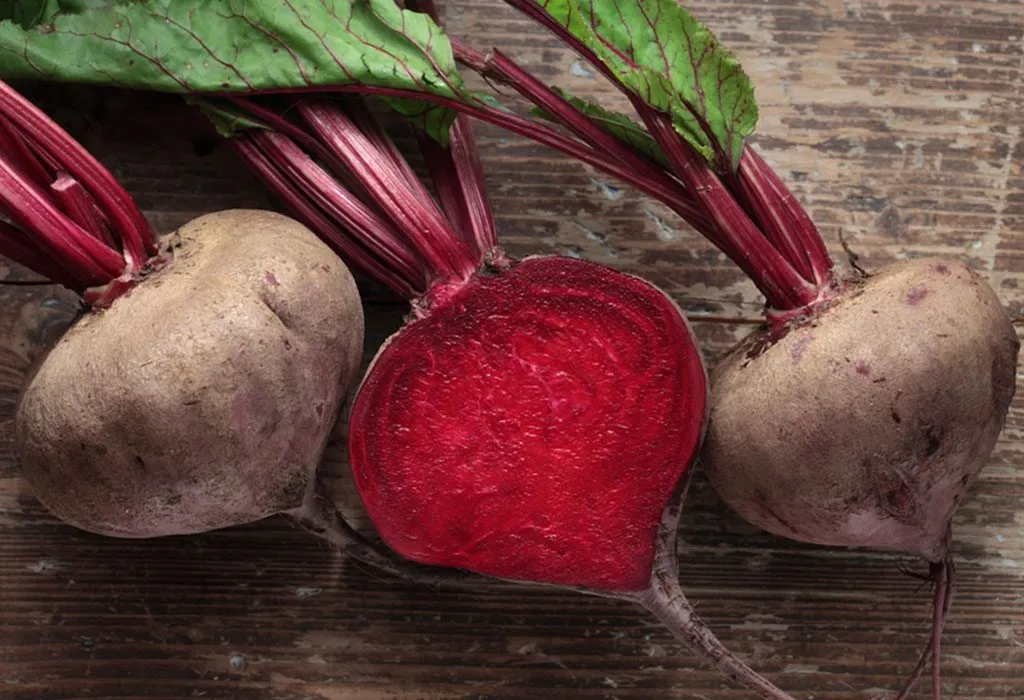Giving Beetroot to Babies – A Healthy Diet Option

- Is Beetroot Safe for Babies?
- Nutritional Value of Beetroot
- When to Give Beetroot to a Baby?
- Amazing Health Benefits of Beetroot for Babies
- Precautions to Take While Feeding Beetroots to Infants
- How to Cook Beets for a Baby?
- Simple Homemade Beetroot Recipes for Babies
- How to Prepare Beetroot for Baby-led Weaning?
- FAQs
Once your baby has hit the 6-month mark, it is recommended that you slowly begin to introduce her to solid foods to help her gain essential nutrients. A solid-food diet can supplement breastfeeding or formula feeding to give your baby an overall healthy diet. With its ample nutritional benefits, beetroot is an excellent choice for your baby’s first few solid-food experiences. Beetroot is rich in vitamins and minerals like folate, potassium, and iron, essential for your baby’s growth and development. However, consult your baby’s doctor before introducing any new food items to ensure they are safe and suitable for her delicate digestive system. Let’s learn all about beetroot for infants.
Is Beetroot Safe for Babies?
Like most vegetables, beetroot is safe for babies and can be introduced to your little one once she has started consuming solid foods. Packed with nutrients, beetroot is known to aid development in infants and can be easy on their palette as well. Start with small quantities and give the beets in a form that your baby will easily be able to digest.
Nutritional Value of Beetroot
Beetroot is a good source of several nutrients. A comprehensive nutritional value chart of beets is given below.
| Nutrients | Nutritional Value per 100 grams |
| Water | 86.9gm |
| Protein | 1.95gm |
| Carbohydrate | 6.18gm |
| Energy | 35kcal |
| Iron | 0.76mg |
| Fibre | 2.8g |
| Phosphorous | 36.3mg |
| Sodium | 69.4mg |
| Calcium | 16mg |
| Magnesium | 33.2mg |
| Zinc | 0.35mg |
| Thiamin | 0.01mg |
| Niacin | 0.21mg |
| Folate | 97.3ug |
| Vitamin C | 5.26mg |
| Vitamin A | 0.09mg |
| Vitamin K | 2.98ug |
| Vitamin E | 0.09mg |
When to Give Beetroot to a Baby?
Unsure about when can babies eat beets? Most paediatricians suggest that beets should be introduced to babies after 8 to 10 months. You can discuss this with your baby’s doctor before you add beets to your little one’s diet. Limit the quantity of beetroot to 1 or 2 teaspoons, as it is rich in nitrates which may be hard for your baby to digest. You can cook or steam the beets as they are more beneficial than uncooked beets.
Amazing Health Benefits of Beetroot for Babies
Beets are a good source of nutrition and minerals, owing to which they offer a number of health benefits to babies (1).
1. Rich in Vitamins and Minerals
Beets have an abundance of vitamins and minerals, including Vitamins A, B, C, K, and E, and potassium, magnesium, calcium, iron, etc. These are known to prevent and lower the risk of several diseases in kids including, diarrhoea, night blindness, beriberi, angular stomatitis, rickets, glossitis, osteomalacia, etc.
2. Lowers the Risk of Anaemia
Rich in iron content, beets will reduce your baby’s risk of anaemia. Iron promotes the production of red blood cells, provides oxygen to different parts of the body, and also aids in the development of your baby’s brain.
3. Promotes Digestion
Beets are rich in fibre and can soothe the digestive system, improve digestion, and prevent constipation in babies.
4. Boosts Immunity
Beetroot is also known for enhancing the immune system due to the antioxidants present in them. This is particularly important for babies as their immune systems are still developing.
5. Cleanses the Body
Paired with cucumber and carrot juice, beetroot juice is known to cleanse the body, especially the gallbladder and the kidneys.

Precautions to Take While Feeding Beetroots to Infants
Introduce beets slowly to your baby and do not give her more than 1 or 2 teaspoons before she is one year old. After that, you can increase the quantity a little, but still, keep it under a few teaspoons. Give your baby other vegetables that she will find pleasant like carrots and potatoes. Your baby may not like the earthy flavour of the beets and may take some time getting used to it.
Also, introduce only one vegetable or fruit at a time. Wait for four days to see if your baby reacts adversely to beetroot. If you notice any allergic reaction, consult a doctor immediately.
How to Cook Beets for a Baby?
When you are cooking beets for your baby, the best way to prepare it is by steaming or boiling it. This makes it easier to make purees out of the beets which your baby can easily digest. Steaming also makes the Vitamin A beta-carotene bio-available, which means that your baby’s body can easily use it once it is consumed.
Get fresh medium-sized beets (as they are more tender) and rinse them thoroughly. Cut off the greens of the beets and peel them. You should always peel the beets as the skin is harder to digest, even for adults. To cook them, you will need to:
- Boil water in the saucepan.
- Slice the beets and add them to the water.
- Cook them for 15 minutes or until they are tender.
- Drain the beets and rinse them under cold water to stop the cooking process.
- Puree them in a blender until you achieve a smooth consistency.
Simple Homemade Beetroot Recipes for Babies
Here are some simple beetroot recipes that can enhance the flavour of the vegetable for your baby.
1. Purple Potatoes
This recipe is simple and fun for both you to make and your baby to eat.
What you need:
- 2 medium beetroots
- 1 carrot
- 2 potatoes
- Water
How to make:
- Wash all the vegetables, peel them, and cut them into slices.
- Boil some water in a saucepan and add the sliced vegetables.
- Cook them until they are tender.
- Drain the water out and puree them in a blender.
- You can add salt to taste.
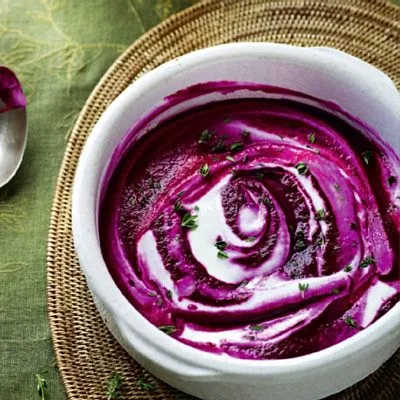
Source: Pinterest
2. Beetroot Soup
You can also make a delicious beetroot soup for your baby’s first beetroot experience.
What you need:
- Beetroots- 3
- Potato- 1
- Onion- 1
- Vegetable broth- 2 cups
- Yoghurt- ¼ cup
How to make:
- Peel and dice the beetroots and potatoes and chop the onion.
- In a saucepan, add all the ingredients except yoghurt. Add water in the and boil it.
- Once the veggies are cooked, drain, and puree them.
- Add the fresh yoghurt to this puree.
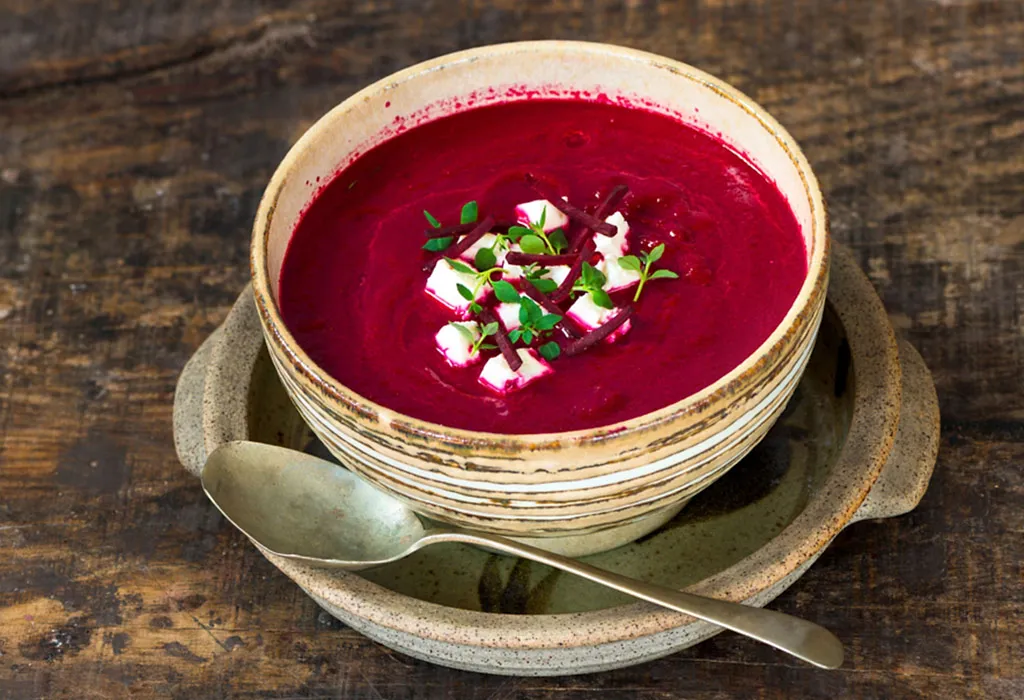
3. Beetroot Puree
Beetroot puree for baby is the easiest way to introduce beets to your little one.
What you need:
- 2 cooked beets
- ½ small onion (or carrots)
- A pinch of ground nutmeg
- 2 tablespoons homemade applesauce
How to make:
- Chop the onion.
- In a pan, add some oil and sauté the chopped onions.
- Puree the beets, sauteed onions, nutmeg, along with the applesauce in the blender.
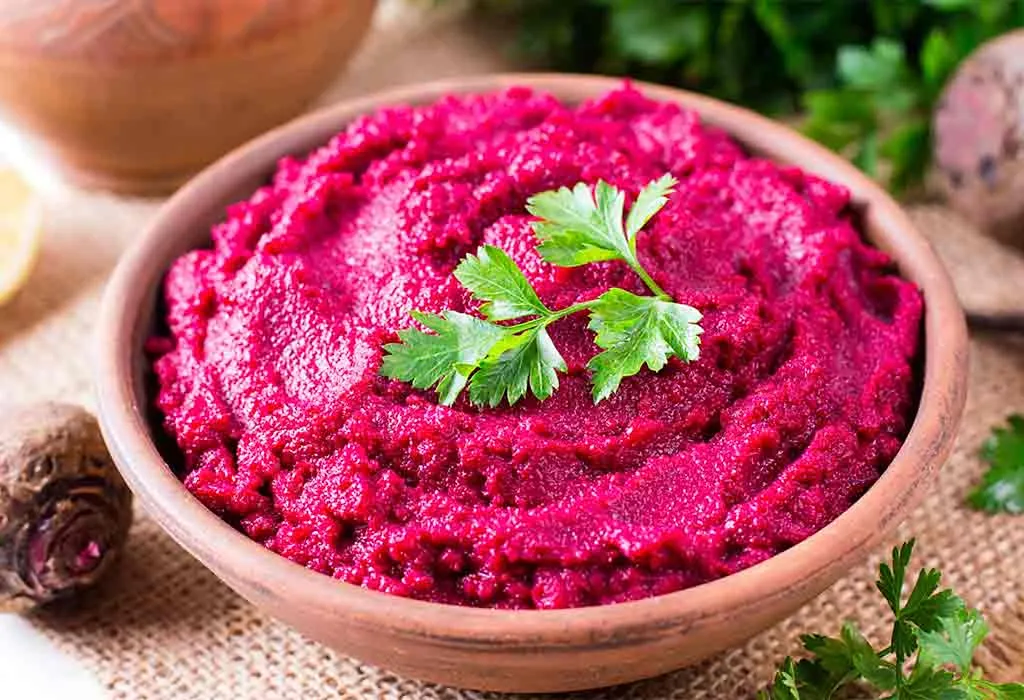
4. Apple Beetroot Porridge
This delicious apple beetroot porridge is a delicious dish for a baby.
What you need:
- 1 beetroot
- 1 apple
- Ginger
- ¼ cup oats
- ½ cup milk
How to make:
- Peel and grate the beets, apples, and ginger.
- Add all the ingredients in a pan and cook them for five minutes.
- Stir the mixture until the veggies are cooked and soft.
- If needed, you can add more milk into the porridge to achieve a smoother texture.
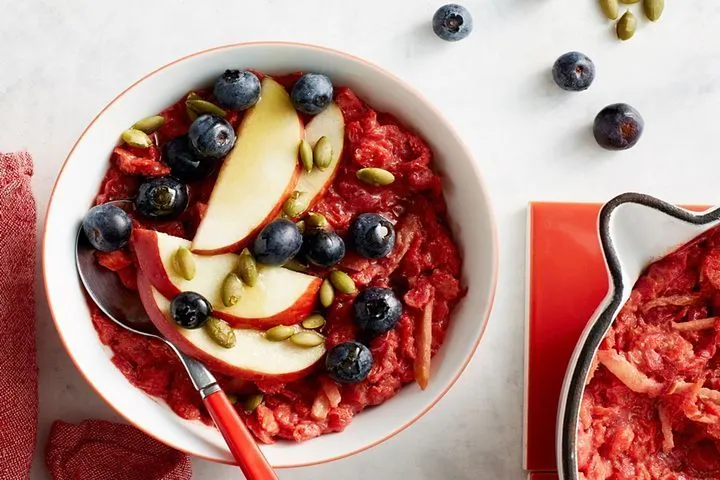
Source: Pinterest
5. Mashed Beetroot
The simplest way to give your baby beets is to mash it.
What you need:
- 2 beets
- 1 apple
- 1 potato
How to make:
- Peel and chop all the beetroot and potatoes.
- Steam them until they are tender. You can add the apples at the end.
- Once tender, mash them together, and make it into a puree.
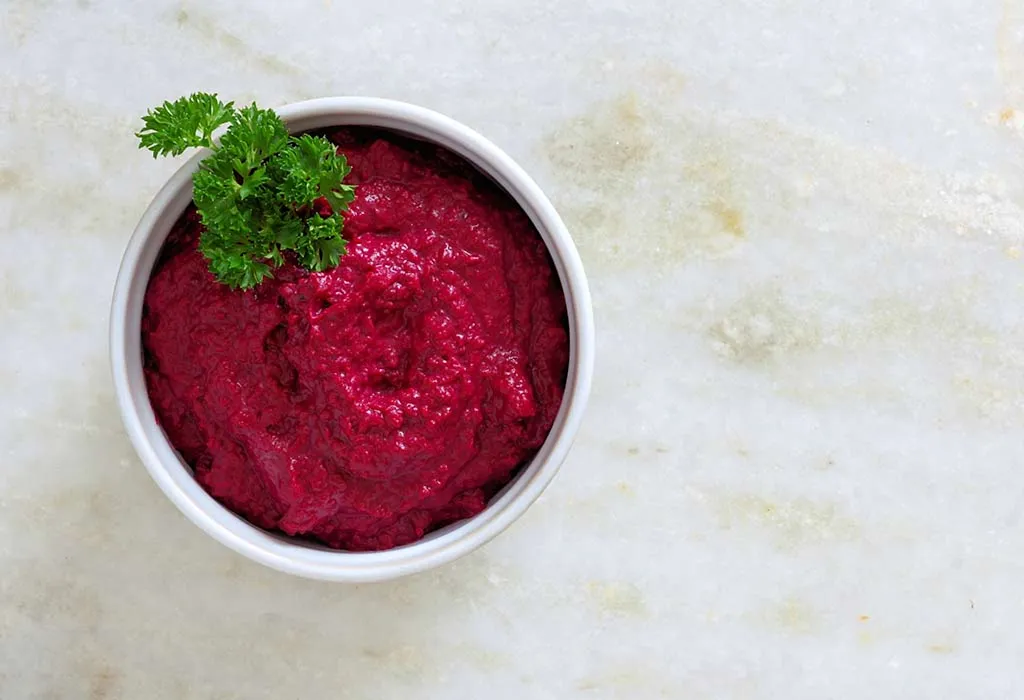
6. Beetroot and Banana Smoothie
A refreshing and nutritious blend for your baby’s palate.
What you need:
- 1 small beetroot
- 1 ripe banana
- ½ cup plain yogurt
- Water or breast milk (as needed for consistency)
How to make:
- Peel and chop the beetroot and banana.
- Add them to a blender along with yogurt.
- Blend until smooth, adding water or breast milk gradually to reach the desired consistency.
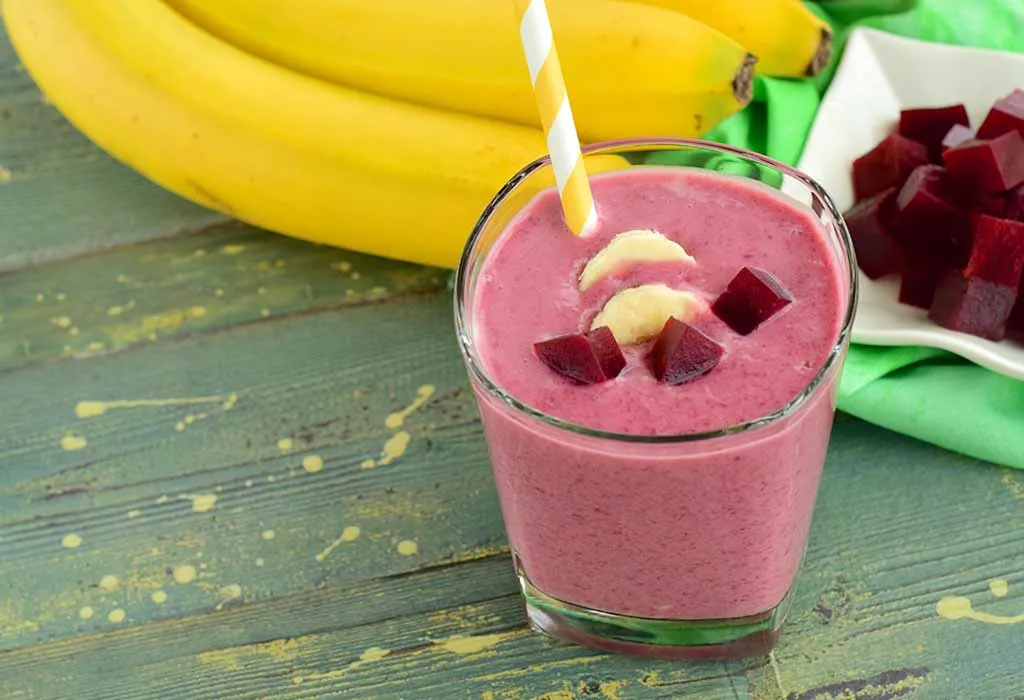
7. Beetroot and Avocado Mash
Creamy and nutritious, this mash is perfect for introducing healthy fats to your baby.
What you need:
- 1 small beetroot
- ½ ripe avocado
- 1 teaspoon lemon juice
- A pinch of salt (optional)
How to make:
- Steam or boil the beetroot until tender.
- Mash the beetroot and avocado together with lemon juice.
- Add a pinch of salt if desired and serve as a creamy side dish for your baby.
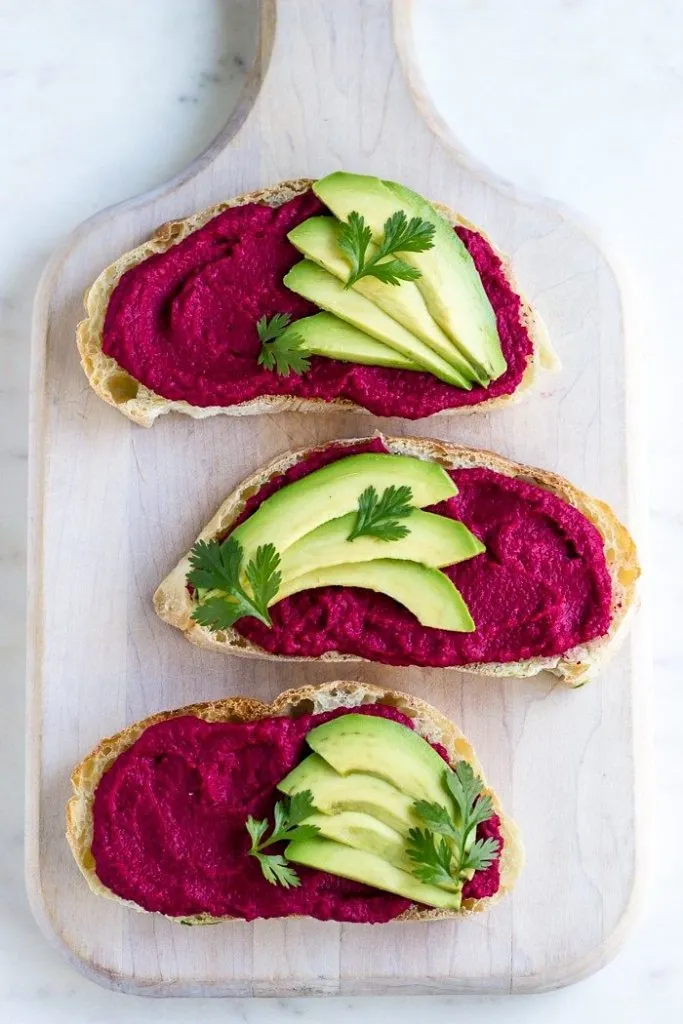
Source: Pinterest
8. Beetroot and Lentil Puree
A hearty and nutritious puree packed with protein and fiber.
What you need:
- 1 beetroot
- ½ cup cooked lentils
- 1 teaspoon olive oil
- A pinch of cumin powder
How to make:
- Peel and dice the beetroot.
- In a saucepan, heat olive oil and sauté the beetroot until tender.
- Add cooked lentils and cumin powder.
- Puree the mixture until smooth.
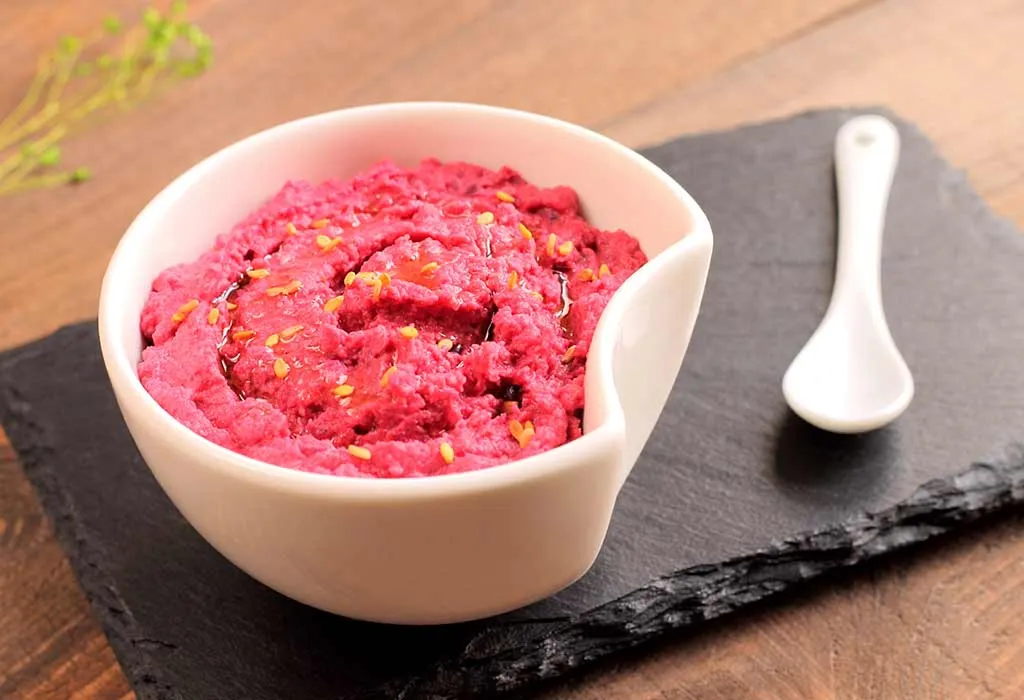
9. Beetroot and Spinach Pancakes
These colorful pancakes are loaded with iron and vitamins.
What you need:
- 1 small beetroot
- 1 cup spinach leaves
- 1 egg
- 2 tablespoons flour (whole wheat or oat)
- A pinch of baking powder
How to make:
- Grate the beetroot and finely chop the spinach.
- In a bowl, whisk the egg and add flour and baking powder.
- Fold in the grated beetroot and chopped spinach.
- Cook spoonfuls of the batter in a greased pan until golden brown on both sides.
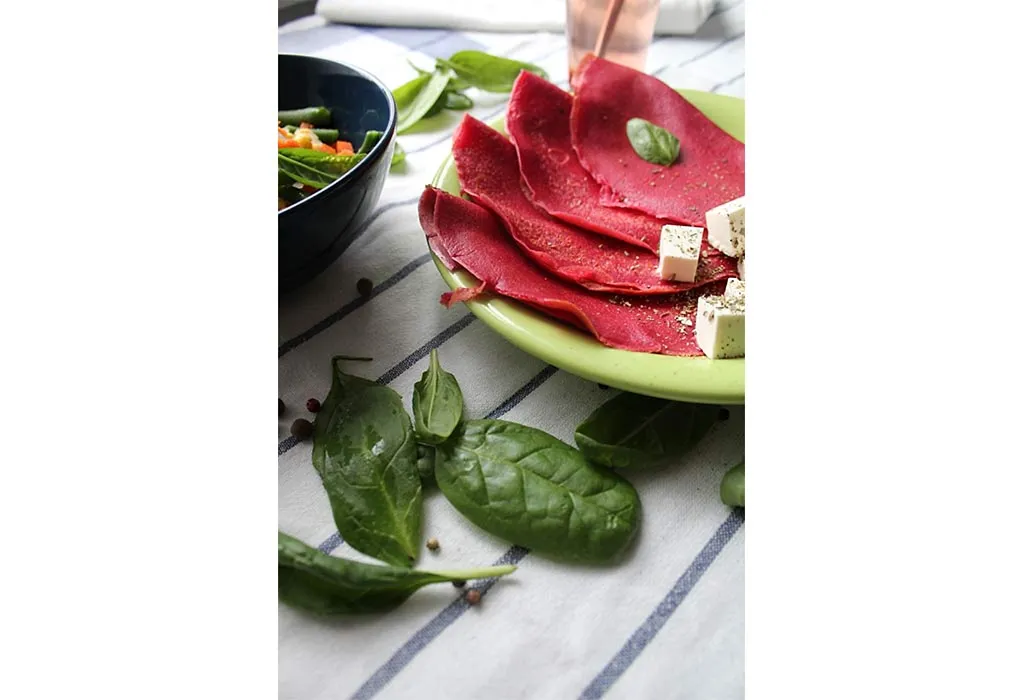
How to Prepare Beetroot for Baby-led Weaning?
Introducing beetroot to your baby through baby-led weaning can be an exciting journey, allowing them to explore the vibrant color and unique taste of this nutritious vegetable. It’s essential to prepare beetroot appropriately to ensure it’s safe and manageable for your little one to handle. Here’s how you can do it based on your baby’s age:
For 6 to 8 Months:
At this stage, babies are still developing their fine motor skills and may not have teeth, so it’s crucial to prepare beetroot in a way that is easy to grasp and chew.
- Steam or boil the beetroot until it’s soft and tender.
- Cut the beetroot into finger-sized pieces or thick sticks, making it easier for your baby to hold.
- Supervise your baby closely as they explore the beetroot, allowing them to grasp, lick, and chew on the pieces at their own pace.
For 9 to 12 Months:
By this age, babies may have developed better hand-eye coordination and chewing skills, enabling them to handle more substantial pieces of food.
- Continue steaming or boiling the beetroot until it’s soft but still firm enough to hold its shape.
- Cut the beetroot into larger chunks or wedges, encouraging your baby to pick up and self-feed.
- Offer cooked beetroot alongside other finger foods to encourage independent eating and exploration.
For 12 to 24 Months:
Toddlers in this age range are likely more proficient at self-feeding and may enjoy exploring different textures and flavors.
- Roast or bake beetroot slices or wedges until they are tender and slightly caramelized, enhancing their natural sweetness.
- Cut the beetroot into bite-sized pieces or shapes that are easy for your toddler to pick up with their fingers.
- Serve beetroot as part of a balanced meal or snack, offering variety and promoting healthy eating habits from a young age.
FAQs
1. Is beetroot a choking hazard for babies?
Beetroot can present a choking hazard for babies if not prepared properly. It’s essential to cook beetroot until it’s soft and tender and cut it into appropriate sizes for your baby’s age and stage of development to minimize the risk of choking.
2. Can beet cause black stool in infants?
Yes, consuming beets can sometimes cause black or dark-colored stool in infants. This discoloration is harmless and typically occurs due to the natural pigments present in beets, which may not be fully digested. However, if you notice any other concerning symptoms or changes in your baby’s stool, it’s advisable to consult a healthcare professional for further evaluation.
Once your baby is ready to transition into solid foods, introducing her to any new food items like beets should be done gradually and after consultation with the doctor. Introduce only one vegetable at a time and give your baby’s body the chance to get used to it. If your baby shows any adverse reaction to any food, you must consult a doctor immediately.
References/Resources:
1. 5 Health Benefits of Beets; Cleveland Clinic; https://health.clevelandclinic.org/the-health-benefits-of-beets/
2. 10 Healthy Reasons to Brighten Your Meals with Beets; Food Revolution Network; https://foodrevolution.org/blog/benefits-of-beets/
3. Chen. L, Zhu. Y, Hu. Z, Wu. S, Jin. C; Beetroot as a functional food with huge health benefits: Antioxidant, antitumor, physical function, and chronic metabolomics activity (Food, Science & Nutrition); National Library of Medicine; https://www.ncbi.nlm.nih.gov/pmc/articles/PMC8565237/; November 2021
4. Clifford. T, Howatson. G, West. D, Stevenson. E; The Potential Benefits of Red Beetroot Supplementation in Health and Disease (Nutrients); National Library of Medicine; https://www.ncbi.nlm.nih.gov/pmc/articles/PMC4425174/; April 2015
5. Mirmiran. P, Houshialsadat. Z, Gaeini. Z, Bahadoran. Z, Azizi. F; Functional properties of beetroot (Beta vulgaris) in management of cardio-metabolic diseases (Nutrition & Metabolism); BMC; https://nutritionandmetabolism.biomedcentral.com/articles/10.1186/s12986-019-0421-0; January 2020
Also Read:
Nutmeg for Infants
Giving Garlic to Babies
Introducing Yogurt to Babies
Health Benefits of Strawberries for Babies



